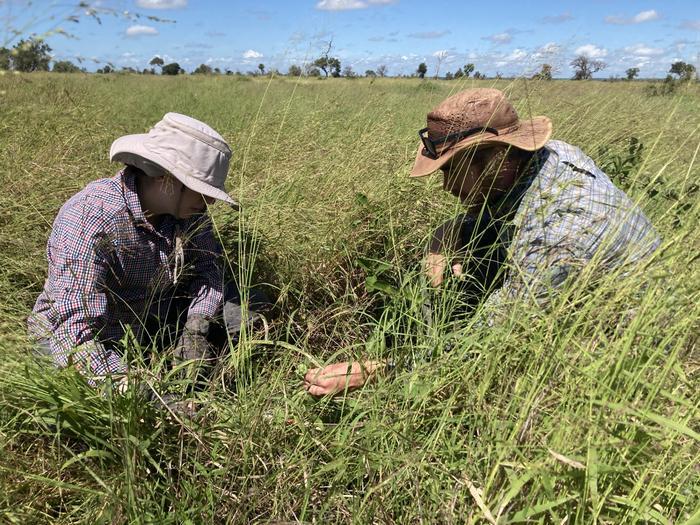Greensboro, N.C. (October 13, 2023) – Newly published research from UNC Greensboro’s Dr. Kevin Wilcox and colleagues will help scientists better predict how global changes – such as droughts, fires, and heat waves – will impact the health and sustainability of the Earth’s grassy ecosystems.

Credit: A. Rodgers
Greensboro, N.C. (October 13, 2023) – Newly published research from UNC Greensboro’s Dr. Kevin Wilcox and colleagues will help scientists better predict how global changes – such as droughts, fires, and heat waves – will impact the health and sustainability of the Earth’s grassy ecosystems.
The article, published October 10, 2023, in Global Change Biology, provides key steps forward to improving mathematical models that forecast changes to our planet’s savannas, prairies, grasslands, and arctic tundras.
“Forest ecosystems tend to get the lion’s share of public attention,” said Wilcox. “But ecosystems dominated by non-tree vegetation – that is, ‘grassy’ ecosystems – make up 40 percent of Earth’s land surface. So our research is playing important scientific ‘catch-up’ in these landscapes.”
Grassy ecosystems provide many necessary resources and services to humans, including food production, pollinators, and carbon sequestration. They also serve as critical habitat for wildlife, such as elk and bison in North America.
Yet, when one looks deeper into humankind’s ability to predict how these ecosystems will persist under forthcoming global changes, the research lags far behind the predictive capacity for forests. Wilcox’s research on Earth system models is helping to close this gap.
Scientists use these models to simulate the effects of physical phenomena, such as droughts and heat waves, on landscapes. The mathematical equations that make up these models are strung together to create thousands of lines of computer code that ultimately provide an abstraction of reality. These models represent a wide range of ecological processes, such as rainfall penetrating the soil, insects defoliating a savanna, or heat stress causing plant and animal mortality.
“But if our models don’t accurately represent ecological processes, their predictions are meaningless,” said Wilcox.
An important facet to get right, Wilcox explains, is the ever-changing nature of these grassy systems.
“We can’t just assume that all of the major components of the ecosystem, such as plant communities, will remain unchanged as droughts and heat waves continue to occur.”
One of the biggest challenges is how grasses are represented. Currently, many models represent grasses as either miniature trees or as a ‘green slime’ that exists on the surface of the planet. The authors say this representation may be part of why the models have had trouble matching real-world observations in grassy ecosystems.
“Better collaboration between empiricists and modelers will also be key for improving herbaceous dynamics within ecosystem models,” adds Wilcox.
Implementing these changes, the authors say, will be vital in helping guide public policy and management of these important ecosystems in the future, when droughts and deluges are more frequent and extreme, disturbances such as fires are more severe, and human pressures continue.
###
About UNC Greensboro
Located in North Carolina’s third largest city, UNC Greensboro is among the most diverse, learner-centered public research universities in the state, with nearly 18,000 students in eight colleges and schools pursuing 175 areas of undergraduate and 250 areas of graduate study. UNCG continues to be recognized nationally for academic excellence, access, and affordability. UNCG is ranked No. 1 most affordable institution in North Carolina for net cost by the N.Y. Times and No. 1 in North Carolina for social mobility by The Wall Street Journal — helping first-generation and lower-income students find paths to prosperity. With a portfolio of more than $67M in research and creative activity, UNCG’s 1,100 faculty and 1,700 staff help create an annual economic impact for the Piedmont Triad region in excess of $1B.
Journal
Global Change Biology
DOI
10.1111/gcb.16950
Method of Research
Computational simulation/modeling
Subject of Research
Not applicable
Article Title
Accounting for herbaceous communities in process-based models will advance our understanding of “grassy” ecosystems
Article Publication Date
10-Oct-2023
COI Statement
N/A




